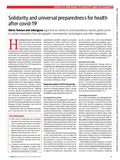| dc.contributor.author | Tomson, Göran | |
| dc.contributor.author | Causevic, Sara | |
| dc.contributor.author | Ottersen, Ole Petter | |
| dc.contributor.author | Peterson, Stefan Swartling | |
| dc.contributor.author | Rashid, Sabina | |
| dc.contributor.author | Wanyenze, Rhoda Kitti | |
| dc.contributor.author | Yamin, Alicia Ely | |
| dc.date.accessioned | 2022-06-13T08:35:38Z | |
| dc.date.available | 2022-06-13T08:35:38Z | |
| dc.date.copyright | 2021 | |
| dc.date.issued | 2021-01-22 | |
| dc.identifier.citation | Tomson, G., Causevic, S., Ottersen, O. P., Swartling Peterson, S., Rashid, S., Wanyenze, R. K., & Yamin, A. E. (2021). Solidarity and universal preparedness for health after covid-19. The BMJ, 372 doi:10.1136/bmj.n59 | en_US |
| dc.identifier.uri | http://hdl.handle.net/10361/16969 | |
| dc.description | This article was published in BMJ Global Health by BMJ Journals [This is an Open Access article distributed in accordance with the Creative Commons Attribution Non Commercial (CC BY-NC 4.0) license, Published by BMJ.] and the definite version is available at: https://doi.org/10.1136/bmj.n59 The Journal's website is at: https://www.bmj.com/content/372/bmj.n59 | en_US |
| dc.description.abstract | Humankind has set a historical precedent in the past century with enormous social and economic transformations, advancement, and prosperity in many parts of the world. These have been supported by technological innovations, increased life expectancy, and changing governance from autocratic to democratic in many countries. However, socioeconomic disparities remain worldwide, limiting the achievement of the UN 2030 Agenda for Sustainable Development.1
An important reason for these disparities is that megatrends—activities, movements, or patterns that fundamentally alter individual, social, and technological behavioural structures—have never been so pervasive, explosive, or accelerated.2 Megatrends such as demographic changes, global environmental change, power imbalances, and technological innovations are having long lasting effects.3 Adding to these, gender inequality has failed to recognise and reward women’s potential.4 The scarcity of natural resources and increased consumption have reinforced the competition for global resources, further intensifying distribution inequities. Because of these inequities, the covid-19 pandemic has hit unevenly.
Automation after the industrial revolution transformed the labour market, population growth caused increased urbanisation, while fossil fuels carbon emissions, urbanisation, and environmental pollution have accelerated the global threat of climate change and are still spiralling out of control. Demographic changes have led us to encroach on habitats of species that are hosts to viruses with pandemic potential and increased their opportunities to jump from one species to another.5 Once new viruses have entered a human host, our interconnectedness resulting from urbanisation and mobility allow them to spread quickly and effectively. We witnessed this scenario in the initial phase of the covid-19 pandemic when the virus got a foothold on all continents within weeks of its first known occurrence in Wuhan, China.6 | en_US |
| dc.language.iso | en_US | en_US |
| dc.publisher | BMJ | en_US |
| dc.relation.uri | https://www.bmj.com/content/372/bmj.n59 | |
| dc.subject | Solidarity | en_US |
| dc.subject | Universal preparedness for health | en_US |
| dc.subject | COVID-19 | en_US |
| dc.title | Solidarity and universal preparedness for health after covid-19 | en_US |
| dc.type | Journal Article | en_US |
| dc.description.version | Published | |
| dc.contributor.department | Brac James P. Grant School of Public Health | |
| dc.identifier.doi | https://doi.org/10.1136/bmj.n59 | |
| dc.relation.journal | BMJ | |

